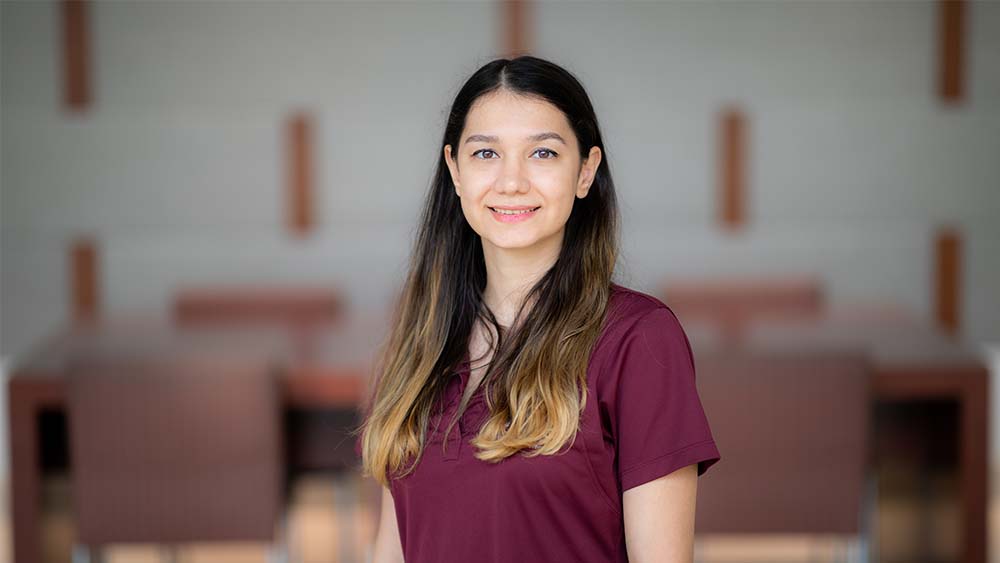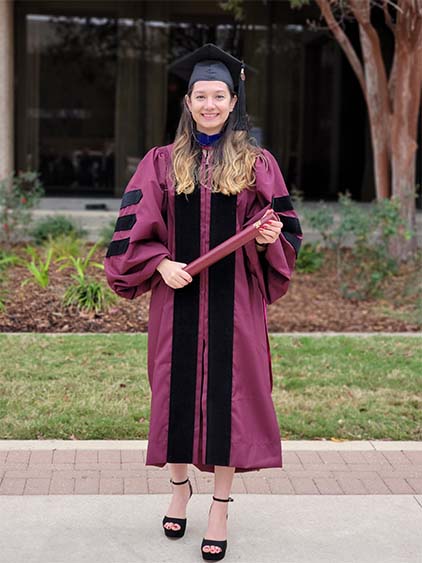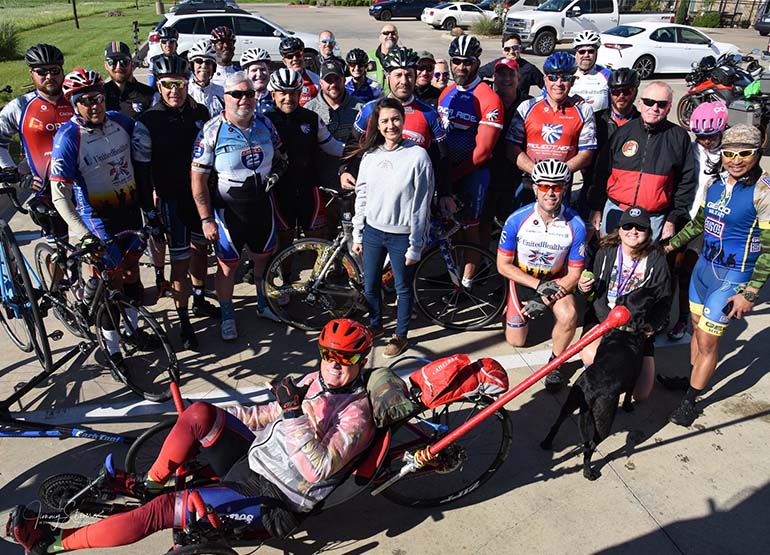
Dr. Mahnoosh Sadeghi recently graduated with her Ph.D. She felt from an early age she was destined to be an engineer. |
Image: Justin Baetge
It’s been four years since she’s seen her parents, and her face lights up when she talks about going home to Iran soon. Dr. Mahnoosh Sadeghi has just graduated with a Ph.D. in the Wm Michael Barnes ’64 Department of Industrial and Systems Engineering at Texas A&M University, and she’s taking her talents to industry.
But first, the 29 year old is going on a solo journey to the Middle East to explore the sights and sounds of Istanbul and Dubai, before heading home to visit family in Iran. After that, she’s thinking about road tripping across the United States before landing in Houston to begin her new position as a consultant for McKinsey & Company.
Since her days growing up in Tehran, Iran, Sadeghi was destined to become an engineer.
But first, the 29 year old is going on a solo journey to the Middle East to explore the sights and sounds of Istanbul and Dubai, before heading home to visit family in Iran. After that, she’s thinking about road tripping across the United States before landing in Houston to begin her new position as a consultant for McKinsey & Company.
Since her days growing up in Tehran, Iran, Sadeghi was destined to become an engineer.
I think I was a junior or senior when I started thinking about grad school. I knew my options were much better if I went to graduate school, because the jobs have better salaries.

Sadeghi graduated in December 2021 with a Ph.D. She’s accepted a position as a consultant with McKinsey & Company in Houston. |
Image: Courtesy of Dr. Mahnoosh Sadeghi
“My mom was a teacher, and my dad was an engineer,” she said, adding that her uncles are also engineers.
It was inside the walls of her mother’s elementary classroom where a young Sadeghi first discovered her love for math. That curiosity turned into raw talent in high school as she continued to excel in math, winning the prestigious Kharazmi award for physics and math.
When it came time for Sadeghi to go to college, she decided to major in petroleum engineering and economics at Sharif University of Technology in Tehran, Iran.
“I think I was a junior or senior when I started thinking about grad school,” she said. “I knew my options were much better if I went to graduate school, because the jobs have better salaries.”
Sadeghi said graduate school also opened some doors for her to one day work in academia and teach the next generation, like her mother had.
“When I was a senior, I started applying to graduate schools, and I got into Texas A&M,” she said.
She was impressed by the faculty in the industrial and systems engineering department, as well as the department’s national ranking — most recently ranked No. 8 best for graduate programs among public institutions by U.S. News and World Report. After one year in her master’s program, she decided to apply to the Ph.D. program, so she could continue the research she was conducting.
It was inside the walls of her mother’s elementary classroom where a young Sadeghi first discovered her love for math. That curiosity turned into raw talent in high school as she continued to excel in math, winning the prestigious Kharazmi award for physics and math.
When it came time for Sadeghi to go to college, she decided to major in petroleum engineering and economics at Sharif University of Technology in Tehran, Iran.
“I think I was a junior or senior when I started thinking about grad school,” she said. “I knew my options were much better if I went to graduate school, because the jobs have better salaries.”
Sadeghi said graduate school also opened some doors for her to one day work in academia and teach the next generation, like her mother had.
“When I was a senior, I started applying to graduate schools, and I got into Texas A&M,” she said.
She was impressed by the faculty in the industrial and systems engineering department, as well as the department’s national ranking — most recently ranked No. 8 best for graduate programs among public institutions by U.S. News and World Report. After one year in her master’s program, she decided to apply to the Ph.D. program, so she could continue the research she was conducting.

Sadeghi with Project Hero cyclists during one of many weeklong bike trips in which she accompanied veterans to gather and analyze data about post-traumatic stress disorder. |
Image: Courtesy of Dr. Mahnoosh Sadeghi
Sadeghi participated in research in the Applied Cognitive Ergonomics (ACE) Lab, under her advisor Dr. Farzan Sasangohar.
“My research is about enabling or creating a system that can detect panic attacks in people with post-traumatic stress disorder (PTSD) and notify them immediately and help them cope with those events,” she said.
Sadeghi worked with more than 300 combat veterans throughout the course of her four-year Ph.D. program. Partnering with Project Hero, a nonprofit organization that hosts bike rides for veterans and first responders, Texas A&M researchers would accompany participants on weeklong bike rides. During the bike rides, researchers would follow along in vehicles, checking in frequently with participants, who were wearing smart watches equipped with heart monitors. By collecting and analyzing data, the smart watch app can now predict when a panic attack will occur and provide appropriate coping mechanisms to its user.
The research was life changing for Sadeghi because she was able to see the direct impact of applied research.
“One day, I got a text from a veteran who said he was feeling bad and the app really helped him,” she said. “He had a lot of panic attacks, and that was such a big moment because I knew with the work I had done, I could have an impact on someone’s life.”
She said knowing the research she was doing was helping veterans made it even more important.
“Observing what they are going through, I can’t even describe it in words,” she said.
Sadeghi also served as president of Texas A&M’s graduate chapter of Society of Women Engineers (SWE), which was also important for her education.
“SWE helped me a lot,” she said. “It gave me a lot of experiences to meet different people from different backgrounds. It was one of the best experiences I had here.”
The industrial and systems engineering department also hosts many networking events for graduate students to experience more in their education.
“Through those events I found a lot of friends,” she said.
While she’s packing her bags and leaving Aggieland, Sadeghi said choosing to earn a graduate degree at Texas A&M was a great decision.
“Give it a try, even if it’s just a master’s. It adds a lot of value, and the jobs you have after graduate school are not comparable to what you have with only an undergrad,” she said. “You have different experiences, get to know different people and grow a lot as a person. It’s totally worth it.”
“My research is about enabling or creating a system that can detect panic attacks in people with post-traumatic stress disorder (PTSD) and notify them immediately and help them cope with those events,” she said.
Sadeghi worked with more than 300 combat veterans throughout the course of her four-year Ph.D. program. Partnering with Project Hero, a nonprofit organization that hosts bike rides for veterans and first responders, Texas A&M researchers would accompany participants on weeklong bike rides. During the bike rides, researchers would follow along in vehicles, checking in frequently with participants, who were wearing smart watches equipped with heart monitors. By collecting and analyzing data, the smart watch app can now predict when a panic attack will occur and provide appropriate coping mechanisms to its user.
The research was life changing for Sadeghi because she was able to see the direct impact of applied research.
“One day, I got a text from a veteran who said he was feeling bad and the app really helped him,” she said. “He had a lot of panic attacks, and that was such a big moment because I knew with the work I had done, I could have an impact on someone’s life.”
She said knowing the research she was doing was helping veterans made it even more important.
“Observing what they are going through, I can’t even describe it in words,” she said.
Sadeghi also served as president of Texas A&M’s graduate chapter of Society of Women Engineers (SWE), which was also important for her education.
“SWE helped me a lot,” she said. “It gave me a lot of experiences to meet different people from different backgrounds. It was one of the best experiences I had here.”
The industrial and systems engineering department also hosts many networking events for graduate students to experience more in their education.
“Through those events I found a lot of friends,” she said.
While she’s packing her bags and leaving Aggieland, Sadeghi said choosing to earn a graduate degree at Texas A&M was a great decision.
“Give it a try, even if it’s just a master’s. It adds a lot of value, and the jobs you have after graduate school are not comparable to what you have with only an undergrad,” she said. “You have different experiences, get to know different people and grow a lot as a person. It’s totally worth it.”
Dr. Mahnoosh Sadeghi recently graduated with her Ph.D. and is spending time traveling before beginning her new career in industry. |
Video: Justin Baetge